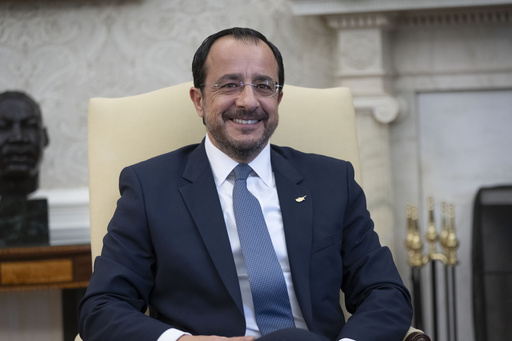President Joe Biden and Cypriot President Nikos Christodoulides convened on Wednesday to examine a fresh initiative aimed at negotiating cease-fires intended to halt the ongoing conflicts in Lebanon and Gaza. Christodoulides, who presides over the European Union nation closest to the Gaza Strip, emphasized Cyprus’s pivotal involvement in facilitating humanitarian aid to Gaza amid the escalating turmoil between Hamas and Israel that has persisted for over a year.
Following their discussions, Christodoulides informed reporters that Biden and his aides had briefed him on the intensified measures being undertaken by the U.S. and other entities in the region, although he withheld additional specifics regarding their conversation. He stated, “The most important priority that the international community has now is to have a cease-fire in the region.”
In a related development, senior officials from the White House, Brett McGurk and Amos Hochstein, are scheduled to travel to Israel on Thursday to engage in discussions surrounding potential cease-fires in both Lebanon and Gaza, as well as the release of hostages held captive by Hamas, as per a source who preferred to remain anonymous. Additionally, CIA Director Bill Burns is scheduled to visit Egypt on the same day to further these discussions.
Insights from other familiar with ongoing negotiations reveal that a cease-fire proposal aimed at ending hostilities between Israel and Hezbollah suggests a two-month halt in fighting, during which Israeli military forces would withdraw from Lebanon and Hezbollah would similarly cease its armed activities along the southern border of the country.
During their meeting, Biden expressed gratitude to Cyprus for its assistance in delivering vital humanitarian supplies to Gaza and acknowledged the island’s cooperation regarding the ramifications of Russia’s invasion of Ukraine. This meeting occurred shortly after U.S. and Cypriot officials announced a new strategic dialogue that seeks to enhance security and stability in a region afflicted by crisis, including joint initiatives in counterterrorism training for personnel from Middle Eastern nations and efforts to combat sanctions evasion.
This latest coordination exemplifies Cyprus’s increasingly strong ties with the United States, particularly following decades of balancing relations between Washington and Moscow. Since Russia began its military aggression in Ukraine in 2022, Cyprus has been drawn closer to the U.S.
Biden remarked, “Today we stood against Russia’s vicious onslaught against Ukraine. We launched a strategic dialogue, increased our cooperation across various domains, from energy security to artificial intelligence, and we surged humanitarian aid, delivering 8,000 metric tons to Gaza.”
As part of their collaborations, the U.S. is also funding a center on the island known as CYCLOPS, which is designed to train personnel from Cyprus and neighboring countries in maritime security, cybersecurity, and counterterrorism strategies. Furthermore, the Cypriot government has enhanced coordination with local law enforcement, the U.S. Department of Justice, and the FBI to effectively tackle the evasion of international sanctions against Russia and other countries.
The FBI is actively involved in training Cypriot law enforcement units to identify and prosecute illegal financing activities and other attempts to circumvent U.S., European Union, and U.N. sanctions. Recently, Cyprus and the United States signed a defense cooperation framework, which specifies how the two nations can collaboratively address regional humanitarian crises and security issues.
Christodoulides highlighted Cyprus’s role as a “predictable and reliable partner” to the United States, particularly in a region marked by significant geopolitical challenges. Earlier this year, Cyprus aided the U.S. in establishing a maritime corridor to deliver humanitarian resources to Gaza.
However, the $230 million temporary pier project aimed at facilitating this maritime delivery faced widespread criticism, described by some as a misallocation of resources. The project encountered numerous obstacles, including adverse weather, security concerns, and stringent personnel restrictions, ultimately leading the Pentagon to abandon the initiative after four months.
The Biden administration had aspired for this maritime route and pier to supply food to 1.5 million individuals for a span of 90 days. Unfortunately, it only succeeded in providing enough provisions for approximately 450,000 people over a month before operations ceased, according to an inspector general report from USAID.


